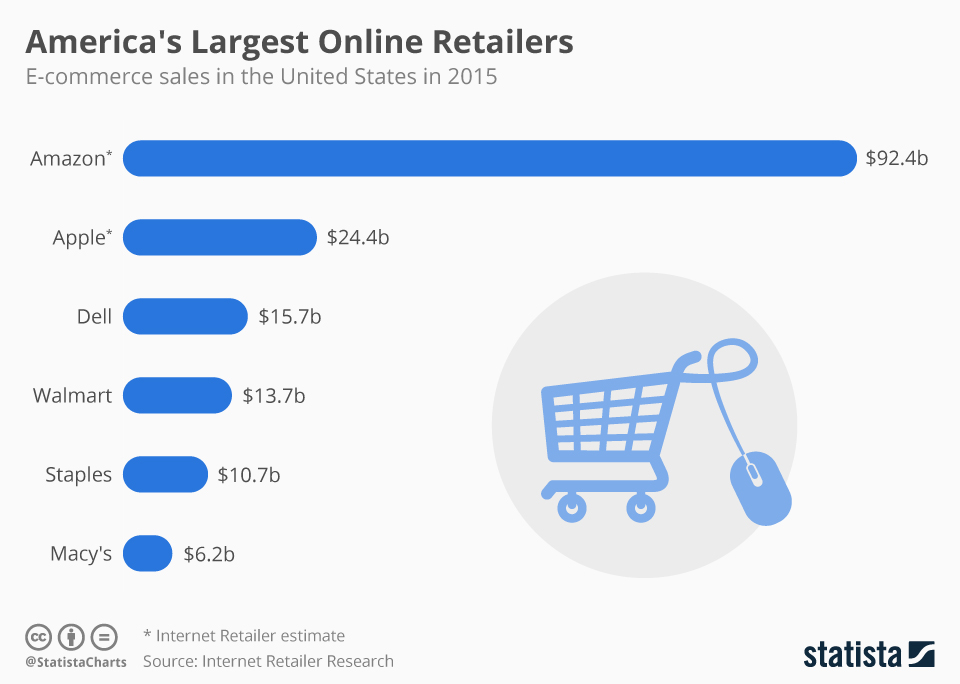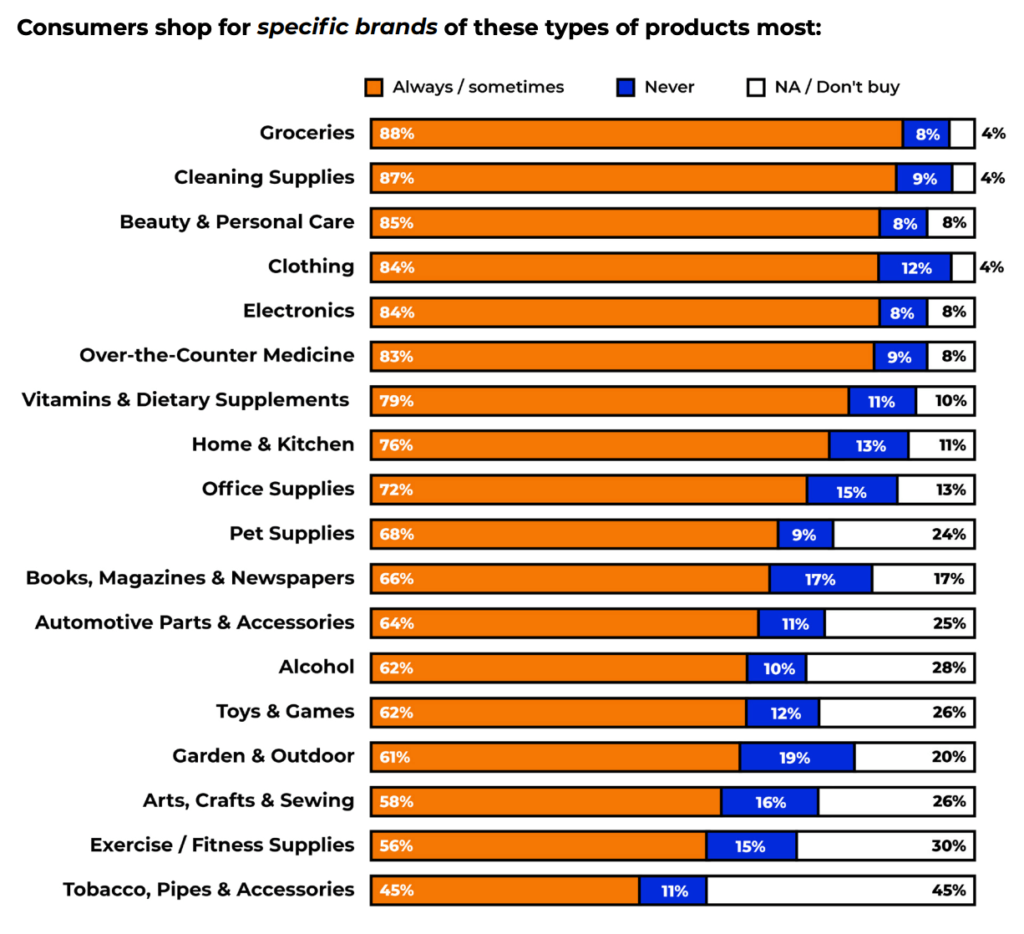If you’re wondering which online retailer holds the title for being the second largest in the US, you’re in for an interesting discovery. In the vast world of e-commerce, where giants like Amazon reign supreme, it may come as a surprise that there’s another player holding a significant position. So, who exactly is this second largest online retailer? Prepare to be intrigued as we unveil the answer that might just change your perception of the digital retail landscape. If you asked yourself this question, you’re not alone. The e-commerce space is constantly evolving, with new players entering the market and existing ones vying for dominance. In this article, we will take a closer look at some of the top retailers in the US, including Amazon, Walmart, eBay, Apple, Target, The Home Depot, Best Buy, Macy’s, Wayfair, and Costco. We will examine their sales and market shares, product categories, subscription services, e-commerce expansion, investments in technology, customer experience, and more. So, let’s dive right in!

This image is property of www.statista.com.
Amazon
When it comes to online retail, it’s hard to ignore the giant that is Amazon. With its vast product selection and fast shipping options, it has become the go-to online marketplace for many consumers. Amazon’s sales and market share are unmatched, making it the largest e-commerce retailer in the US and worldwide. The company offers a wide range of product categories, from electronics and home goods to clothing and books. But Amazon doesn’t stop there. It has also ventured into the subscription services market, with offerings like Amazon Prime, which provides members with fast, free shipping, streaming services, and more.
Walmart
As the largest brick-and-mortar retailer in the US, Walmart has been expanding its e-commerce presence to compete with Amazon. While its online sales and market share are not on par with Amazon, Walmart has been making strides to bridge the gap. The company has focused on expanding its e-commerce capabilities, improving its website, and offering convenient options like online grocery pickup and delivery. Walmart has also invested heavily in technology, aiming to enhance its online shopping experience and improve customer satisfaction.
eBay
An entirely different kind of marketplace, eBay operates on a unique model where individuals can sell both new and used items directly to consumers. While eBay’s sales and market share may not be as high as Amazon or Walmart, it still holds a significant position in the e-commerce space. One of eBay’s strengths lies in its strong seller community, which allows individuals to set up their own virtual stores and sell a wide variety of products. Additionally, eBay Motors has gained popularity as a platform for buying and selling vehicles, attracting car enthusiasts and collectors around the world.
Apple
Known for its innovative and high-quality products, Apple has built a strong presence in the digital market. Although Apple is primarily known for its hardware, such as iPhones, MacBooks, and iPads, the company also focuses on digital products and services. With its App Store, Apple Music, and iCloud offerings, the company has entered the digital content and subscription space. In terms of sales and market share, Apple ranks high in the electronics category, attracting loyal customers who are drawn to its sleek design and user-friendly interfaces. Apple also operates physical retail stores, where customers can experience their products firsthand and seek assistance from knowledgeable staff.

This image is property of cdn.geekwire.com.
Target
Target, a well-known retail chain in the US, has been making significant strides in the e-commerce sector. While its online sales and market share may not be as high as Amazon or Walmart, Target has experienced impressive e-commerce growth. The company has made strategic investments in technology to improve its online platform, resulting in a more seamless shopping experience for customers. One of Target’s key strengths is its store pickup option, which allows customers to order online and pick up their items at a local store, eliminating the need for shipping. This service has been well-received by customers looking for convenience and immediate access to their purchases.
The Home Depot
For DIY enthusiasts and homeowners, The Home Depot is the go-to destination for all things related to home improvement. Although primarily known as a brick-and-mortar retailer, The Home Depot has established itself as a prominent online DIY retailer as well. Customers can browse and purchase a wide range of products, from tools and building materials to appliances and decor, all from the comfort of their own homes. The Home Depot has also invested in digital tools and customer experiences, providing online guides and tutorials to assist its customers in their DIY projects. Additionally, the company offers a Pro Account Program, catering to contractors and professionals in the industry, further expanding its market reach.

This image is property of www.oberlo.com.
Best Buy
With its focus on electronics and appliances, Best Buy has cemented its position as a leading retailer in this category. While facing tough competition from online giants like Amazon, Best Buy has managed to maintain solid sales and market share. One of Best Buy’s key advantages is its Geek Squad services, offering technical support and assistance to customers. This unique service has become a significant selling point for the company, as customers value the expertise and peace of mind that comes with their purchases. Best Buy also offers in-store pickup and installation services, providing convenience and expert guidance for those who prefer a more hands-on shopping experience.
Macy’s
As one of the largest department stores in the US, Macy’s has a strong online presence, making it a significant player in the e-commerce space. The company offers a wide range of products, from clothing and accessories to home goods and beauty products. Macy’s rewards program is a notable feature, allowing customers to earn points and enjoy exclusive perks and discounts. By focusing on beauty and fashion, Macy’s has carved out a niche for itself, attracting customers who appreciate its curated selection and trendy offerings. With a well-designed website and a commitment to customer satisfaction, Macy’s continues to thrive in the online retail landscape.

This image is property of cdn.statcdn.com.
Wayfair
When it comes to home furnishings and decor, Wayfair is a name that often comes up. With its extensive product range and emphasis on personalization and customization, Wayfair has become a top destination for those seeking to decorate their homes. The company’s sales and market share in the home goods category are impressive, as it offers a vast selection of furniture, lighting, decor, and more. Wayfair’s customer support is highly regarded, providing assistance and guidance to customers throughout their shopping journey. By prioritizing the customer experience and offering tailored recommendations, Wayfair has created a loyal customer base that keeps coming back for more.
Costco
Known for its warehouse club model, Costco stands out in the retail industry with its membership-based approach. While Costco’s online sales and market share may not rival those of Amazon or Walmart, the company has experienced steady e-commerce growth. Costco’s membership model offers customers exclusive access to bulk discounts and deals, appealing to individuals and businesses alike. The company has also made investments in its online platform, providing a seamless shopping experience for its members. By combining the convenience of online shopping with the savings of a warehouse club, Costco has successfully carved out its niche in the retail market.
In conclusion, the second-largest online retailer in the US is not a simple answer. Multiple retailers have a strong presence in different categories and offer unique features and experiences. Whether it’s Amazon’s vast product selection, Walmart’s e-commerce expansion, or eBay’s unique marketplace model, each retailer brings something different to the table. Additionally, retailers like Apple, Target, The Home Depot, Best Buy, Macy’s, Wayfair, and Costco all have their own strengths and strategies to cater to their respective markets. The e-commerce landscape is constantly evolving, and these retailers continue to adapt and innovate to stay ahead in a highly competitive industry.

This image is property of www.junglescout.com.
